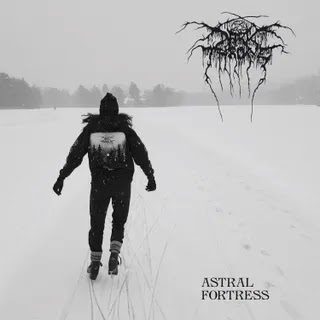The apparent effortlessness (and occasional silliness) of the metal band’s 20th album could make it feel tossed off, but the duo’s enthusiasm mostly prevents that from happening.
If Darkthrone had retired after 1992’s A Blaze in the Northern Sky, they still might have gone down as the most influential band in black metal history. The nihilistic Norwegian scene they emerged from ate bands alive, but Darkthrone survived. The same two-man lineup of Nocturno Culto and Fenriz has stuck around for 35 years now, and instead of milking their early success on anniversary-themed nostalgia tours, they’ve continued to make records. (They don’t even play shows, and never have.) There’s a new Darkthrone LP out every couple of years, and each one pushes the band a little further away from their black metal roots. Astral Fortress is the band’s 20th album, and like its immediate predecessors, Old Star and Eternal Hails, it finds Darkthrone in thrall to the analog warmth of ’70s hard rock and the thunderous stomp of classic doom.
The stakes never feel particularly high on Darkthrone albums anymore, which usually works in the band’s favor. They release a ton of music, and almost all of it is at least pretty good. Nocturno Culto and Fenriz have already pushed each other to peaks that few others have scaled, and if they now tend to sound more like a couple of aging pals jamming together, that’s their prerogative. Astral Fortress continues what the band calls their “old metal” era, and its songs are lumbering, prehistoric beasts, straightforward in structure and firmly in-the-pocket in execution. Fenriz can’t quite swing like Bill Ward behind the kit—he credits himself with “cave drumming” in the album’s sleeve—but he’s tapping into the same primordial well that once birthed Black Sabbath. He and Nocturno Culto both still sound genuinely enthralled by metal’s elemental power. The apparent effortlessness (and occasional silliness) of Astral Fortress could make it feel tossed off, but the band’s enthusiasm mostly prevents that from happening.
“The Sea Beneath the Seas of the Sea”—the album’s 10-minute centerpiece—best illustrates Darkthrone’s half-serious approach. (That begins with the title, which evokes fathomless Lovecraftian horror and the giddy idiocy of a rehearsal-room goof-off in equal measure.) It opens with a distant, reverb-drenched guitar line, an eerily effective run of notes that sets the scene for the primitive grandeur to come. Additional elements soon start to pile on—a series of hypnotic riffs, a simple, thudding drum pattern, Nocturno Culto’s inimitable rasp. The first six minutes build in density and mass before releasing all its tension in an unaccompanied recitation of the title that lands like a punchline. “The Sea” is an effective, economical epic that remains single-minded in its purpose, a reversal of the “riff salad” approach of some of Darkthrone’s previous long songs. It’s probably the best “Doomthrone” tune to date.
Isolated moments of greatness lurk inside every other song on Astral Fortress, too. “Impeccable Caverns of Satan” drops a chest-clearing “ough” that would make Tom G. Warrior blush. “Stalagmite Necklace” rolls out a handful of vintage keyboard sounds that serve as vital counterweights to some of the best riffs on the album. “Kevorkian Times” veers off its initially doomy course to briefly revisit the band’s crusty D-beat era, kicking the tempo up just when the album needs a shot of adrenaline. “Eon 2” has the album’s best lead guitar parts in what feels like a subtle nod to the last true Darkthrone masterpiece, 2013’s trad-metal-obsessed The Underground Resistance. If there’s any black metal on Astral Fortress at all, it’s only in the sense that if Darkthrone made it, it must be black metal.
Darkthrone’s reluctance to revisit their hallowed past has long been one of their most admirable qualities. Even A Blaze in the Northern Sky was a refusal to capitulate to audience expectations; it followed the band’s Swedish death metal-inspired debut, Soulside Journey. In true Darkthrone fashion, Astral Fortress feels like it was primarily made to satisfy Fenriz and Nocturno Culto. It’s an album that’s defined less by its sporadic moments of brilliance than its ambivalence about delivering them. At times, that can make it feel a little too low-key, but in a nostalgia-choked metal scene where legendary bands repeatedly return to the sound that secured their legacy, Darkthrone’s solitary path is refreshing.



0 comments:
Post a Comment